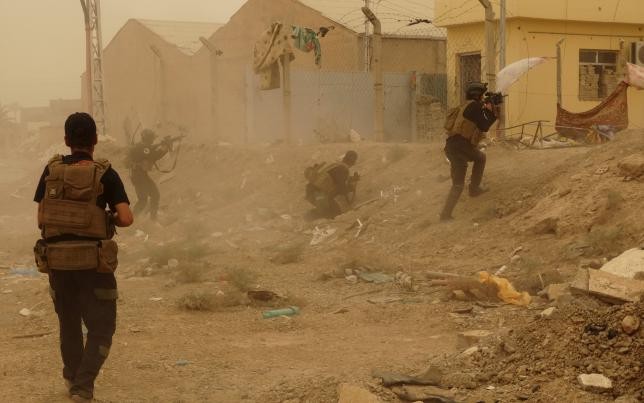(VOVworld) – Major cities in Iraq and Syria have fallen to the Islamic State (IS) in recent months, despite air strikes by the US, Europe, and Saudi Arabia. The situation is challenging the US and the West to reconsider their strategy for dealing with IS.

Iraqi security forces defend their headquarters against attacks by IS in the eastern part of Ramadi in Anbar province, May 14, 2015. (Reuters/Stringer)
|
Over the past 5 days, IS has occupied Ramadi city in Iraq and Palmyra city in Syria. After taking control of Ramadi, capital of Anbar province, IS is now approaching Baghdad. In Syria, IS has captured 2,000-year-old Palmyra city and 50% of Syria’s territory, mainly oil-rich areas. Repeated failures have blunted the US-led coalition’s efforts against IS.
Has the coalition failed?
After a series of failures, some American military experts and senators have criticized President Obama’s strategy against IS. They say the US, Europe, and Saudi Arabia have launched operations against IS without appropriate coordination. IS has shown no sign of weakening.
Before IS stormed two major cities in Iraq and Syria, Washington, London, and the Arab league released positive reports, which said that IS had been pushed back and weakened by shortages of money and weapons. The reality is quite different. IS has broadened its presence in Iraq and Syria an increased attacks in Saudi Arabia and Yemen.
Washington has acknowledged that the coalition against IS has experienced a strategic set back but rejected an IS victory. President Obama said the US will not lose the fight against IS and it’s time to adjust its strategy. Former Defense Secretary Robert Gates said supplying anti-tank missiles to the Iraqi army is now called for. Long-term political and military goals have not yet been solidified. So far the US and its allies are still considering their options against IS.
Islamic States expands its occupied zones
The Islamic States keeps expanding its occupied zones and carrying out more and more brutal executions of prisoners, including beheading them or burning them alive. Experts say IS is effectively adapting itself to coalition airstrikes by improving their tactics and training. Before 2007, IS focused on training troops to make explosive devices targeting government forces. Over the past 2 years, IS has shifted their training toward fighting tactics and strategies.
IS used to launch massive attacks, accompanied with heavy weapons, making them suffer casualties quickly and easily. Now IS has shifted to a model of guerrilla warfare. They organize small teams of soldiers, equipped with light weapons and dressed like ordinary people. These guerillas are often active at night and live among the local people, and this has helped them avoid detection.
IS has also decentralized their system, giving more power to their regional leaders. IS’s ability to maintain their operations despite coalition airstrikes is aided by a huge money flow from oil fields in eastern Syria which they occupied in late 2012 plus their smuggling of ancient artifacts from occupied areas.
A comprehensive strategy in need
A comprehensive strategy to fight IS is urgently needed. Some suggest that airstrikes by the US and the coalition can damage IS infrastructure and force them to hide but can’t wipe them out, and that ground forces are the only way to defeat them. But both the US and NATO have refused to send their troops to fight IS. Instead, they have focused on training local troops.
Washington’s approach in this war involves a combination of training local troops, building up the Iraqi army, and bombing IS targets without using ground forces. However, the IS’s occupation of Ramadi City has revealed the Iraqi army’s weakness, which has existed for a long time due to corruption, nepotism, and poor government management.
Some say it’s time for the US to find a new strategy to fight IS, which remains strong despite more than 4000 airstrikes by the coalition over the past 9 months in Iraq and Syria. Coalition ministers will meet in Paris on June 2 to plot a strategy to reverse the recent losses.